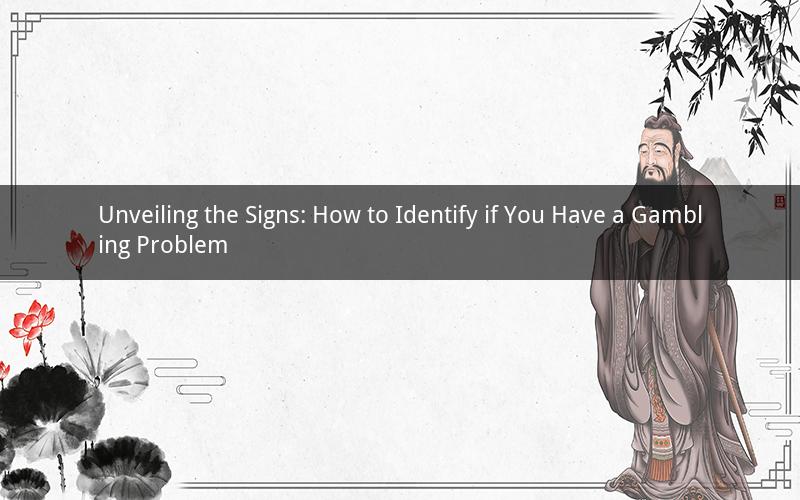
Introduction:
Gambling has become a prevalent form of entertainment worldwide. However, it can easily spiral out of control, leading to severe consequences. Identifying if you have a gambling problem is crucial in taking the necessary steps towards recovery. In this article, we will explore the signs and symptoms that indicate a potential gambling problem and provide guidance on how to seek help.
1. Uncontrollable Urge to Gamble:
One of the primary indicators of a gambling problem is an overwhelming urge to gamble. This urge can be difficult to control and often leads to spending more time and money on gambling activities. If you find yourself constantly thinking about gambling, even when you're not engaged in it, it might be a sign that you have a problem.
2. Financial Struggles:
Gambling problems often manifest through financial difficulties. If you're experiencing frequent money troubles due to gambling, it's a significant red flag. This may include borrowing money, maxing out credit cards, or even stealing to fund your gambling habits. It's crucial to address these financial issues promptly to prevent further escalation.
3. Relationship Strain:
Gambling can strain your relationships with loved ones. If you're neglecting your responsibilities, lying about your gambling activities, or becoming emotionally distant, it's a clear indication that gambling is causing problems in your personal life. Maintaining healthy relationships is essential, and prioritizing them over gambling is a vital step towards recovery.
4. Emotional and Psychological Impact:
Gambling problems can have a profound impact on your emotional and psychological well-being. Feelings of anxiety, depression, guilt, and shame often accompany a gambling addiction. If you're struggling with these emotions and find yourself using gambling as a means to cope, it's a sign that you might have a gambling problem.
5. Physical Symptoms:
Gambling problems can also manifest through physical symptoms. Excessive gambling can lead to sleepless nights, loss of appetite, and overall physical health deterioration. If you're experiencing these symptoms, it's essential to seek help to address the underlying gambling problem.
Seeking Help:
If you suspect that you have a gambling problem, seeking help is the first step towards recovery. Here are some options for obtaining support:
1. Professional Counseling:
Seeking counseling from a mental health professional who specializes in gambling addiction is highly beneficial. They can provide personalized treatment plans and help you develop coping strategies to overcome your gambling problem.
2. Support Groups:
Joining a support group such as Gamblers Anonymous can offer a sense of community and understanding. Sharing your experiences with others who have faced similar challenges can provide emotional support and guidance.
3. Therapy Techniques:
Various therapy techniques can be effective in treating gambling addiction. Cognitive-behavioral therapy (CBT) focuses on identifying and changing negative thoughts and behaviors associated with gambling. Additionally, therapy techniques like motivational interviewing and contingency management can be employed to encourage positive behavior change.
4. Self-Exclusion Programs:
Many casinos and gambling establishments offer self-exclusion programs that allow individuals to ban themselves from gambling venues. Utilizing these programs can help you create a boundary and avoid temptation.
5. Financial Management:
Addressing the financial aspect of your gambling problem is crucial. Seeking financial counseling or creating a budget plan can help you regain control over your finances and prevent future gambling-related financial struggles.
Frequently Asked Questions:
1. Q: Can a person with a gambling problem recover?
A: Yes, recovery from a gambling problem is possible. With proper treatment and support, individuals can overcome their addiction and lead a fulfilling life.
2. Q: Are there genetic factors that contribute to gambling problems?
A: Yes, research suggests that genetic factors can play a role in gambling problems. If you have a family history of gambling addiction, it may increase your risk of developing a problem.
3. Q: Can I overcome a gambling problem on my own?
A: While some individuals may find success in self-help strategies, seeking professional help is often more effective. Professional support can provide tailored guidance and coping mechanisms to address the underlying issues of gambling addiction.
4. Q: Are there medications available to treat gambling problems?
A: Currently, there are no medications specifically designed to treat gambling addiction. However, certain medications may be prescribed to manage co-occurring conditions such as depression or anxiety, which can contribute to gambling problems.
5. Q: Can gambling problems affect my career?
A: Yes, gambling problems can significantly impact your career. Financial difficulties, neglecting responsibilities, and poor decision-making due to addiction can lead to job loss or career setbacks. Seeking help and addressing your gambling problem can help you regain control over your professional life.